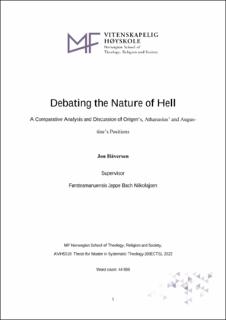Debating the Nature of Hell : A Comparative Analysis and Discussion of Origen’s, Athanasius’ and Augustine’s Positions
Master thesis
Permanent lenke
https://hdl.handle.net/11250/3061149Utgivelsesdato
2022Metadata
Vis full innførselSamlinger
Sammendrag
Is hell real? If so, what’s it like? Or, will everyone eventually be saved? These are the ques-tions examined in this thesis. The questions are of vast importance and have been relentlessly and eagerly debated for centuries.
To help us reach more clarity on this issue I have turned to the three great theologians of the Patristic period: Athanasius, Origen, and Augustine. These three admirable thinkers provide arguments for three distinct perspectives on final punishment for the wicked. Origen gives a sophisticated argument that no one will be eternally lost, but that God eventually will be all in all and bring about the salvation of all human beings, who will be subjected to Him in His new kingdom. Augustine refers to Origen and his allies and calls them “tenderhearted”, but wrong. Augustine himself pays much attention to this topic in his works, claiming that unre-pentant sinners will suffer eternal conscious torment in hell. Athanasius also rejects the idea that all shall be saved and affirms eternal punishment to unrepentant sinners. However, Atha-nasius believes the eternal punishment is an irreversible destruction of the wicked implying that their ultimate fate is a state of non-existence.
I am especially interested in the Biblical arguments for the three distinct perspectives on hell and I am determined to dedicate much attention to the Biblical arguments the three thinkers provide in the primary sources to their theology. In addition to this, I end with both analyzing and discussing their arguments by means of theologians and exegetes from all periods of church history.
